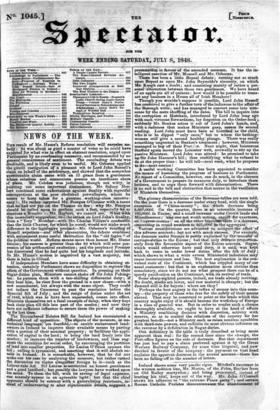NEWS OF THE WEEK.
Tun result of Mr. Hume's Reform resolution will surprise nobody: 84 was about as good a muster of votes as be could have expected for what was in effect an abstract resolution, urged upon Parliament by no overbearing necessity, and recommended by no general concurrence of sentiment. The concluding debate was creditable, and is likely even to be useful. Mr. Osborne applied the gentle castigation of a pleasant wit to Lord John Russell's claim on behalf of the aristocracy, and showed that the somewhat questionable claim came with an ill grace from a gentleman Whose relatives and connexions possess an inordinate share of place. Mr. Cobden was judicious, though not witty, in pointing out some important distinctions. Mr. Sidney Herbert combined some exhortations against finality with regretful retrospections at the poor abolished potwallopers, whom he seems to have taken for a genuine working-class constituency He rather surprised Mr. Feargus O'Connor with a taunt that he had not yet ..et the Thames on fire : why Mr. Feargus should be called upon to perform such a feat, especially by so decorous a Nomber r Mr. Herbert, we cannot see. What with this incendiary suggestion, awl. the attack on Lord John's finality, from a " Tory " Member—with Mr. Charles Villiers's confession that the little Charter, for which be voted, would not make much difference in the legislative product—Mr. Osborne's roasting of Russell nepotism—and other pleasantries, the debate combined with amusement some useful instruction for the "old fpgies " of the political world. Reform means more than honest Mr. Hume fancies; his success is greater than the 84 which will seize possession of his arithmetical exultation; and the perplexed Premier has discovered that he had quite lost his longitude and latitude. So Mr. Hume's motion is negatived by a vast majority, but there is balm in Gilead.
If independent Members have some difficulty in obtaining attention, certainly Parliament shows no disposition to register the edicts of the Government without question. In pressing on their Sugar-duties plan, Ministers cannot shake off Sir John Pukington: he pursues them with a ten-shilling differential duty ; if they beat him, he rises from the ground in a new shape—with a new amendment, but always with the same object. They could not induce the Commons to pass the resolution before the financial 5th of July ; and the range of duties under the act of 1846, which was to have been superseded, comes into effect. Ministers themselves set a fatal example of delay, when they kept back their plan till this late part of the session ; and now they have not sufficient influence to secure them the power of making up for lost time.
The Encumbered Estates Bill for Ireland has encountered a different kind of opposition. The objects of the measure, in untechnical language, are fourfold,—.to enable embarrassed landowners in Ireland to improve their available means by parting with a portion of their nominal property ; to facilitate the application of capital to the land; to bring the land freely into the market; to increase the number of landowners, and thus augment the securities for social order, by encouraging the partition of land into smeller properties. Sir Lucius O'Brien opposes the bill ; calling it tyrannical, and asserting that it will abolish entails in Ireland. It is remarkable, however, that he did not make out his case by analyzing the measure, but rather turned the discussion on topics altogether foreign to it—such as the Labour-rate Act. Sir Lucius is accounted an honest gentleman and a good landlord; but possibly the lawyers have worked upon his mind. To them the bill, with its saving of legal expenses, Can scarcely appear in an agreeable light : but that the chief Opponent should be content with a generalizing resistance instead of endeavouring to alter objectionable details, suggests a presumption in favour of the amended measure. It has the intelligent sanction of Mr. Monsell and Mr. Osborne.
There has been a little Repeal debate ; turning not so much upon Repeal as upon Mr. John Reynolds's sincerity, on which Mr. Keogh cast a doubt; and consisting mainly of rather a personal altercation between those two gentlemen. We have heard of an apple-pie all of quinces: how would it be possible to transact any business in a House all of Irish Members? Though you wouldn't suppose it possible, Lord John Russell has contrived to give a further turn of the ludicrous to the affair of the Borough writs; and has managed to convert sense into nonsense by the mere shuffling of the dates. The bill to inquire into the corruption at Horsham, introduced by Lord John long ago with such virtuous forwardness, lay forgotten on the Order-book ;. suddenly Mr. Bankes seizes it out of Lord John's hands, and, with a rudeness that makes Ministers gasp, moves its second reading. Lord John must have been as horrified as the child, who is to be dipped "only once," but to whom the bathingwoman tvill give a second healthy: plunge. There was really something ungenteel in Bankes's treatment : however, Ministers managed to beg off their Pro'2.r. Next night, that boisterous Stafford again moved the Leicester writ, avowedly to stir up the passive Ministers. Lord John was stirred : he promised to take up Sir John Hammer's bill ; thus stultifying what he refused to do at the proper time : he will tell—next week, what he proposes to do—next session!
A useful working Committee has been appointed to consider the means of hastening the progress of business in Parliament. No report of a Committee, however, can do much, in the absence of a Government to prepare its measures duly, to Introduce them betimes, and to urge them forward with determination. There is no end to the talk and obstruction that accrue in the vacillation of Ministers themselves.


























